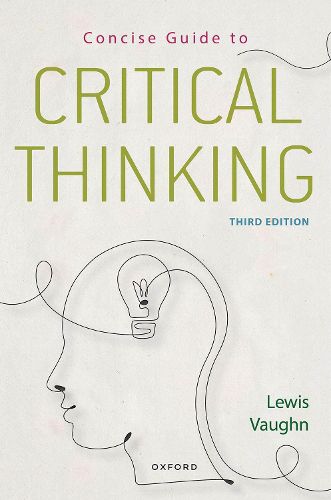Readings Newsletter
Become a Readings Member to make your shopping experience even easier.
Sign in or sign up for free!
You’re not far away from qualifying for FREE standard shipping within Australia
You’ve qualified for FREE standard shipping within Australia
The cart is loading…






Lewis Vaughn's Concise Guide to Critical Thinking, Third Edition, offers a clear and compact introduction to critical thinking and argumentative writing. Based on his best-selling text, The Power of Critical Thinking, this affordable volume strikes a unique balance for instructors. While it is more succinct than the leading comprehensive texts, it covers more key content, and does so more effectively, than any of the briefer critical thinking handbooks. In addition to six core chapters on identifying, evaluating, and devising deductive and inductive arguments, the text features: *Extensive coverage of scientific reasoning, with chapters on inductive reasoning, causal arguments, scientific theories and inference, and scientific method and theory evaluation. * A chapter on obstacles to critical thinking * A chapter on fallacies and rhetorical persuaders * A substantial chapter on writing argumentative essays Throughout the text, Vaughn places emphasis on evaluation of evidence, authority, and credibility. Students don>'t just learn about critical thinking; they learn the skills necessary to think critically. Each chapter reinforces these skills with numerous exercises, including review questions, writing assignments, and self-assessment quizzes.
$9.00 standard shipping within Australia
FREE standard shipping within Australia for orders over $100.00
Express & International shipping calculated at checkout
Lewis Vaughn's Concise Guide to Critical Thinking, Third Edition, offers a clear and compact introduction to critical thinking and argumentative writing. Based on his best-selling text, The Power of Critical Thinking, this affordable volume strikes a unique balance for instructors. While it is more succinct than the leading comprehensive texts, it covers more key content, and does so more effectively, than any of the briefer critical thinking handbooks. In addition to six core chapters on identifying, evaluating, and devising deductive and inductive arguments, the text features: *Extensive coverage of scientific reasoning, with chapters on inductive reasoning, causal arguments, scientific theories and inference, and scientific method and theory evaluation. * A chapter on obstacles to critical thinking * A chapter on fallacies and rhetorical persuaders * A substantial chapter on writing argumentative essays Throughout the text, Vaughn places emphasis on evaluation of evidence, authority, and credibility. Students don>'t just learn about critical thinking; they learn the skills necessary to think critically. Each chapter reinforces these skills with numerous exercises, including review questions, writing assignments, and self-assessment quizzes.